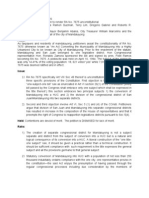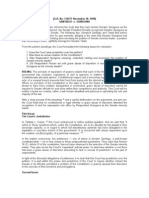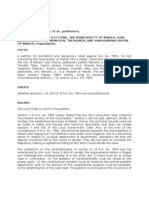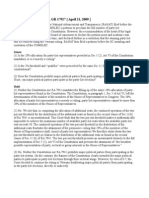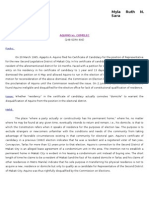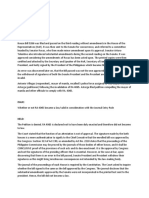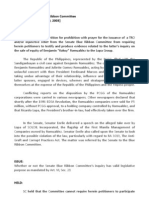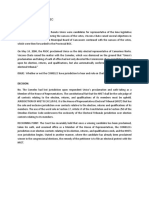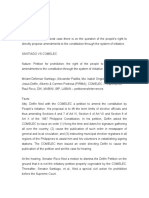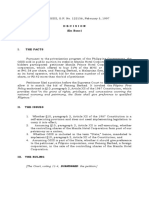Tobias Vs Abalos
Tobias Vs Abalos
Uploaded by
Arvin Jay LealCopyright:
Available Formats
Tobias Vs Abalos
Tobias Vs Abalos
Uploaded by
Arvin Jay LealOriginal Description:
Original Title
Copyright
Available Formats
Share this document
Did you find this document useful?
Is this content inappropriate?
Copyright:
Available Formats
Tobias Vs Abalos
Tobias Vs Abalos
Uploaded by
Arvin Jay LealCopyright:
Available Formats
Tobias vs Abalos, G.R. No.
L-114783 case brief summary
Tobias vs Abalos, G.R. No. L-114783 case brief summary
December 8, 1994
Facts: Complainants, invoking their right as taxpayers and as residents of Mandaluyong, filed a petition
questioning the constitutionality of Republic Act No. 7675, otherwise known as "An Act Converting the
Municipality of Mandaluyong into a Highly Urbanized City to be known as the City of Mandaluyong."
Before the enactment of the law, Mandaluyong and San Juan belonged to the same legislative district.
The petitioners contended that the act is unconstitutional for violation of three provisions of the
constitution. First, it violates the one subject one bill rule. The bill provides for the conversion of
Mandaluyong to HUC as well as the division of congressional district of San Juan and Mandaluyong into
two separate district. Second, it also violate Section 5 of Article VI of the Constitution, which provides that
the House of Representatives shall be composed of not more than two hundred and fifty members, unless
otherwise fixed by law. The division of San Juan and Mandaluyong into separate congressional districts
increased the members of the House of Representative beyond that provided by the Constitution. Third,
Section 5 of Article VI also provides that within three years following the return of every census, the
Congress shall make a reapportionment of legislative districts based on the standard provided in Section
5. Petitioners stated that the division was not made pursuant to any census showing that the minimum
population requirement was attained.
Issue:
(1) Does RA 7675 violate the one subject one bill rule?
(2) Does it violate Section 5(1) of Article VI of the Constitution on the limit of number of rep?
(3) Is the inexistence of mention of census in the law show a lack of constitutional requirement?
Rulings: The Supreme Court ruled that the contentions are devoid of merit. With regards to the first
contention of one subject one bill rule, the creation of a separate congressional district for Mandaluyong is
not a separate and distinct subject from its conversion into a HUC but is a natural and logical
consequence. In addition, a liberal construction of the "one title-one subject" rule has been invariably
adopted by this court so as not to cripple or impede legislation.
The second contention that the law violates the present limit of the number of representatives, the
provision of the section itself show that the 250 limit is not absolute. The Constitution clearly provides that
the House of Representatives shall be composed of not more than 250 members, "unless otherwise
provided by law”. Therefore, the increase in congressional representation mandated by R.A. No. 7675 is
not unconstitutional.
With regards, to the third contention that there is no mention in the assailed law of any census to show
that Mandaluyong and San Juan had each attained the minimum requirement of 250,000 inhabitants to
justify their separation into two legislative districts, unless otherwise proved that the requirements were
not met, the said Act enjoys the presumption of having passed through the regular congressional
processes, including due consideration by the members of Congress of the minimum requirements for the
establishment of separate legislative district
The petition was dismissed for lack of merit.
You might also like
- Local Government A8. MARIANO v. COMELEC 242 SCRA 211 March 07, 1995 FactsDocument2 pagesLocal Government A8. MARIANO v. COMELEC 242 SCRA 211 March 07, 1995 FactsApril Valencia100% (1)
- DEFENSOR-SANTIAGO V GUINGONADocument1 pageDEFENSOR-SANTIAGO V GUINGONAMacky LeeNo ratings yet
- Guingona vs. CaragueDocument2 pagesGuingona vs. CaragueKelsey Olivar MendozaNo ratings yet
- In Re Cunanan Case DigestDocument4 pagesIn Re Cunanan Case DigestRichard Balais88% (8)
- Bolinao Electronics v. Valencia Case DigestDocument2 pagesBolinao Electronics v. Valencia Case DigestPatricia Anne Villamor100% (1)
- Tobias vs. AbalosDocument2 pagesTobias vs. AbalosJohn Byron Jakes Lasam100% (2)
- SANTIAGO vs. GUINGONADocument4 pagesSANTIAGO vs. GUINGONADanniel James Ancheta100% (5)
- Mariano vs. COMELEC DigestDocument2 pagesMariano vs. COMELEC DigestEumir Songcuya100% (2)
- Case Digest Mariano Vs ComelecDocument2 pagesCase Digest Mariano Vs Comelecmellikeslaw100% (3)
- 11 Mariano Vs Comelec G.R. No. 118577 March 7 1995Document3 pages11 Mariano Vs Comelec G.R. No. 118577 March 7 1995Robert LastrillaNo ratings yet
- Aquino Vs ComelecDocument2 pagesAquino Vs Comelec上原クリス100% (1)
- Philconsa Vs EnriquezDocument3 pagesPhilconsa Vs EnriquezMylaCambriNo ratings yet
- Constilaw1 - Digest Mariano Vs ComelecDocument2 pagesConstilaw1 - Digest Mariano Vs ComelecArthur Archie Tiu100% (1)
- Tolentino vs. COMELEC DigestDocument3 pagesTolentino vs. COMELEC Digestchiclets777100% (4)
- Arroyo vs. de Venecia Case DigestDocument2 pagesArroyo vs. de Venecia Case DigestCombat Gunney100% (6)
- 18 Jimenez v. CabangbangDocument2 pages18 Jimenez v. CabangbangzeeNo ratings yet
- Trillanes Vs Pimentel (2) - G.R. No. 179817, June 27, 2008Document2 pagesTrillanes Vs Pimentel (2) - G.R. No. 179817, June 27, 2008Dyan100% (3)
- Demetria Vs AlbaDocument2 pagesDemetria Vs AlbaAiyu MallariNo ratings yet
- Torralba vs. Municipality of SibagatDocument2 pagesTorralba vs. Municipality of SibagatMariel Grace DelinNo ratings yet
- Abbas Vs Senate Electoral TribunalDocument1 pageAbbas Vs Senate Electoral TribunalChrista Mira Arce PuertosNo ratings yet
- Romualdez-Marcos vs. COMELECDocument3 pagesRomualdez-Marcos vs. COMELECAr-Reb AquinoNo ratings yet
- Daza Vs SingsonDocument1 pageDaza Vs SingsonJanfranzAbellaCasidaNo ratings yet
- Separation of Powers DigestDocument7 pagesSeparation of Powers DigestSean Carlo Rey Loriega100% (1)
- Santiago Vs Guingona Case DigestDocument3 pagesSantiago Vs Guingona Case DigestGe WaldNo ratings yet
- Mariano vs. COMELECDocument1 pageMariano vs. COMELECApril Rose Flores FloresNo ratings yet
- Sbma Vs Comelec Case DigestDocument1 pageSbma Vs Comelec Case DigestJessielle0% (2)
- Sema Vs ComelecDocument2 pagesSema Vs ComelecRainidah Mangotara Ismael-Derico100% (2)
- Aquino v. ComelecDocument1 pageAquino v. Comelecblu_deviantNo ratings yet
- Demetria Vs AlbaDocument1 pageDemetria Vs Albarm2803No ratings yet
- Sema v. ComelecDocument3 pagesSema v. ComelecVanityHughNo ratings yet
- Aquino Vs COMELEC - GR 189793 April 7, 2010Document1 pageAquino Vs COMELEC - GR 189793 April 7, 2010DyanNo ratings yet
- Daza v. Singson dIGESTDocument2 pagesDaza v. Singson dIGESTHelen ToledoNo ratings yet
- Daza Vs Singson Consti1Document1 pageDaza Vs Singson Consti1Shai F Velasquez-Nogoy100% (1)
- Atong Paglaum vs. COMELECDocument3 pagesAtong Paglaum vs. COMELEClotuscas100% (2)
- Banat Vs ComelecDocument2 pagesBanat Vs Comelecsamantha kofer100% (7)
- Banat vs. ComelecDocument1 pageBanat vs. ComelecJan Alexander TolentinoNo ratings yet
- Giron v. COMELEC G.R. No. 188179 (January 22, 2013)Document1 pageGiron v. COMELEC G.R. No. 188179 (January 22, 2013)carol anneNo ratings yet
- Arroyo V de Venecia DigestDocument2 pagesArroyo V de Venecia DigestGlo Allen CruzNo ratings yet
- Gonzales Vs MacaraigDocument1 pageGonzales Vs MacaraigKGTorresNo ratings yet
- Angara v. Electoral CommissionDocument3 pagesAngara v. Electoral CommissionJazem Ansama100% (1)
- Aquino Vs COMELEC Case DigestDocument1 pageAquino Vs COMELEC Case Digestunbeatable38100% (3)
- Digest of Astorga vs. VillegasDocument1 pageDigest of Astorga vs. VillegasPatty PerezNo ratings yet
- Akma-Ptm Vs ComelecDocument15 pagesAkma-Ptm Vs ComelecVernon Craig ColasitoNo ratings yet
- Mabanag Vs Lopez Vito 78 Phil 1Document3 pagesMabanag Vs Lopez Vito 78 Phil 1Neil BorjaNo ratings yet
- Senate v. ErmitaDocument1 pageSenate v. ErmitaKarisse Viaje100% (2)
- Manila Prince Hotel v. GSISDocument2 pagesManila Prince Hotel v. GSISVerlin Amarante EntenaNo ratings yet
- BAGUILAT V ALVAREZDocument2 pagesBAGUILAT V ALVAREZanon_614984256No ratings yet
- BANAT v. COMELEC, G.R. No.179271, April 21, 2009, Resolution Dated July 8, 2009 DigestDocument5 pagesBANAT v. COMELEC, G.R. No.179271, April 21, 2009, Resolution Dated July 8, 2009 DigestAbilene Joy Dela Cruz100% (1)
- Bengzon V Senate Blue Ribbon CommitteeDocument2 pagesBengzon V Senate Blue Ribbon CommitteeKarlyn Ann MagulimanNo ratings yet
- Santiago Vs ComelecDocument1 pageSantiago Vs ComelecKaye PaladNo ratings yet
- Vinzons-Chato Vs COMELECDocument1 pageVinzons-Chato Vs COMELECChrista Mira Arce PuertosNo ratings yet
- Arroyo vs. de VeneciaDocument2 pagesArroyo vs. de VeneciaJade ViguillaNo ratings yet
- Ongsiako-Reyes Vs ComelecDocument1 pageOngsiako-Reyes Vs Comeleczahreenamolina100% (1)
- Puyat vs. de Guzman 1982 Case DigestDocument2 pagesPuyat vs. de Guzman 1982 Case DigestMissMsrh100% (2)
- DIGEST Santiago v. ComelecDocument5 pagesDIGEST Santiago v. ComelecMeet MeatNo ratings yet
- Mabanag vs. Lopez Vito, 78 Phil 1Document2 pagesMabanag vs. Lopez Vito, 78 Phil 1joysnessNo ratings yet
- Bondoc Vs Pineda (Digest)Document4 pagesBondoc Vs Pineda (Digest)caramelsundae100% (1)
- Manila Prince Hotel v. GSIS, G.R. No. 122156, February 3, 1997Document2 pagesManila Prince Hotel v. GSIS, G.R. No. 122156, February 3, 1997Aubrey Caballero100% (1)
- Navarro Vs Ermita (For Share)Document2 pagesNavarro Vs Ermita (For Share)Lara Michelle Sanday Binudin100% (1)
- Defensor-Santiago Vs COMELEC Case DigestDocument4 pagesDefensor-Santiago Vs COMELEC Case DigestXyza Faye Foronda100% (1)
- Tobias V Abalos (Case Digest), G.R. No. L-114783, December 8, 1994Document1 pageTobias V Abalos (Case Digest), G.R. No. L-114783, December 8, 1994Raymer OclaritNo ratings yet
- Abalos Vs SabioDocument2 pagesAbalos Vs SabioLove-Love Jeraldine Mondia DalupinesNo ratings yet
- G3. Tobias v. Abalos 239 SCRA 106Document1 pageG3. Tobias v. Abalos 239 SCRA 106ImmediateFalcoNo ratings yet
- Compilation of Legal FormsDocument1 pageCompilation of Legal FormsArvin Jay LealNo ratings yet
- CrimPro CompilationDocument95 pagesCrimPro CompilationArvin Jay Leal100% (2)
- 012 CASCO PHILIPPINE CHEMICAL CO. v. PEDRO GIMENEZ, GR No. L-17931, 1963-02-28Document10 pages012 CASCO PHILIPPINE CHEMICAL CO. v. PEDRO GIMENEZ, GR No. L-17931, 1963-02-28Arvin Jay LealNo ratings yet
- 3 Executive - Secretary - v. - Forerunner - MultiDocument3 pages3 Executive - Secretary - v. - Forerunner - MultiArvin Jay LealNo ratings yet
- Two Main Group of FallacyDocument2 pagesTwo Main Group of FallacyArvin Jay LealNo ratings yet
- Conditional Syllogisms Enthememes PolysyllogismsDocument42 pagesConditional Syllogisms Enthememes PolysyllogismsArvin Jay LealNo ratings yet
- Reviewer - Agpalo Chap 3Document7 pagesReviewer - Agpalo Chap 3merrytoni100% (1)
- 1.mandate and Role Council: 2.background Topic and Main IssuesDocument4 pages1.mandate and Role Council: 2.background Topic and Main IssuesSacha BubNo ratings yet
- Abakada v. Executive SecDocument37 pagesAbakada v. Executive SecEmman KailanganNo ratings yet
- HUMSS - Philippine Politics and Governance - REVIEWERDocument15 pagesHUMSS - Philippine Politics and Governance - REVIEWERKarlena Ameina Saturnino100% (1)
- Statutory Construction ReviewerDocument50 pagesStatutory Construction ReviewerKonrad Ibabao100% (1)
- Belgica v. Executive Secretary, GR No. 208566, November 19, 2013Document105 pagesBelgica v. Executive Secretary, GR No. 208566, November 19, 2013Erin GarciaNo ratings yet
- The Meaning of A Constitution - Law TroveDocument13 pagesThe Meaning of A Constitution - Law TroveHamza ButtNo ratings yet
- The Language of LegislationDocument25 pagesThe Language of LegislationPedro Alberto SanchezNo ratings yet
- Statcon OutlineDocument6 pagesStatcon OutlineCleofe SobiacoNo ratings yet
- Jammu & Kashmir Reorganisation Act 2019Document55 pagesJammu & Kashmir Reorganisation Act 2019Latest Laws TeamNo ratings yet
- The Law, Litigation and Politics Surrounding Legislators' Pension in Cross River State, NigeriaDocument6 pagesThe Law, Litigation and Politics Surrounding Legislators' Pension in Cross River State, NigeriaKIU PUBLICATION AND EXTENSIONNo ratings yet
- Jan Details (Eng) by AffairsCloudDocument297 pagesJan Details (Eng) by AffairsCloudDk16 252LubanaNo ratings yet
- Quarterly Revision Documents November 2023 Current Affairs Quarterly Revision (Sep-Nov 2023)Document200 pagesQuarterly Revision Documents November 2023 Current Affairs Quarterly Revision (Sep-Nov 2023)lakshmi prasadNo ratings yet
- Regulatory Purpose: Non-Revenue/ Special or RegulatoryDocument6 pagesRegulatory Purpose: Non-Revenue/ Special or Regulatorykristel jane caldozaNo ratings yet
- Tax Quiz 101Document2 pagesTax Quiz 101Donna Zandueta-TumalaNo ratings yet
- Baltimore County IG ReportDocument35 pagesBaltimore County IG ReportChris BerinatoNo ratings yet
- Session 8: Tan v. Del Rosario Digest Tan V Del RosarioDocument7 pagesSession 8: Tan v. Del Rosario Digest Tan V Del RosarioMike E DmNo ratings yet
- 1 Business Law 1 Bcc105Document12 pages1 Business Law 1 Bcc105Logic MasekesaNo ratings yet
- Cases For JudiciaryDocument345 pagesCases For JudiciaryAmorMeaThereseMendozaNo ratings yet
- Conference Committee Report FormDocument11 pagesConference Committee Report FormThe TexanNo ratings yet
- Ephraim V Pastory Case - Tanzania1990 1Document15 pagesEphraim V Pastory Case - Tanzania1990 1jastinerwezaula17No ratings yet
- Constitutional Law (Federalism), Ishu Deshmukh, Semester-II, Roll No.-025Document27 pagesConstitutional Law (Federalism), Ishu Deshmukh, Semester-II, Roll No.-025ishuNo ratings yet
- Admin LawDocument36 pagesAdmin Lawvarunendra pandeyNo ratings yet
- Notes On Indian ConstitutionDocument48 pagesNotes On Indian ConstitutionVinayak Kumar SinghNo ratings yet
- Budget and Budgetary Process in The Parliament of IndiaDocument26 pagesBudget and Budgetary Process in The Parliament of IndiataniiNo ratings yet
- Legal Research BOOKDocument48 pagesLegal Research BOOKJpag100% (2)
- The Telangana Backward Classes Scheduled Castes and Scheduled Tribes Act 2017Document15 pagesThe Telangana Backward Classes Scheduled Castes and Scheduled Tribes Act 2017shyam143225No ratings yet





